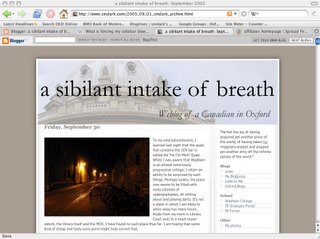This afternoon, I got an invitation to attend a briefing on the final recommendations of the Bi-National Planning Group: one of the bodies that we met with in Colorado as part of the NASCA trip. Formed after September 11th, 2001, their mandate is to investigate security cooperation between Canada and the United States and make recommendations for improvements. They have been involved with projects like the Smart Border accord. While I obviously will not be able to go, I encourage the other NASCA participants to attend, if they can manage it. The briefing Dr. Baker gave us in Colorado Springs was certainly a solid demonstration of the good work that the BPG has been doing. When writing the report (PDF), I remember the BPG as an organization that received nearly universal praise. I look forward to reading their final report on enhanced military cooperation, once it gets released in May.
In a related point, I think I should start attending the meetings of the Oxford Strategic Studies Group, as I know some members of the IR M.Phil program have been doing. Much as I try to concentrate on environmental politics, the international use of force is obviously and permanently central to the study of international relations. As an IR scholar, you would never go hungry with war as your area of interest, especially since the pervasive ‘war on terror’ began. The fact that the strategic studies group meets at All Souls is also a significant point in favour of attending.
For me, environmental politics and strategic studies have a number of common factors that are appealing. They involve interaction with professionals who, as a social scientist (a term I remain skeptical about), you need to understand but not replicate. Scientists and soldiers are both fascinating kinds of people for me. They are endowed with specialist knowledge, which inevitably carries cachet for someone embedded in academia. They are also pleasantly straightforward and expected to be. That’s the reason why our NORAD / NORTHCOM briefing was so satisfying, as conversations with military people of all ranks from both countries have generally been. Speaking with Major General Lewis Mackenzie or cadets at West Point, you get the sense that they are at least making honest arguments that they genuinely want you to understand. Their apparent candour makes a nice contrast with the fiddly, theoretical bits of politics that seem to fascinate some of my friends and colleagues and that mostly just exasperate me. The same goes for scientists: whether those working at the UBC Fisheries Centre, people involved in the Northern Contaminants Program and Stockholm Convention, or others. Part of that comes from being unusually willing to admit when something is uncertain: perhaps the true mark of professionalism in such disciplines.
Another appealing commonality is the obvious possibility of making real-world improvements in both our approach to the environment and to war. These aren’t just areas that we should study for the sake of understanding better. We need to step beyond that and direct that understanding towards improvement. Again, the kinds of philosophical arguments that assert that such progress is impossible – that, in some complex way, such efforts are self-defeating – are exasperating to me. If we can significantly reduce the number of people who get malaria or AIDS, who suffer malnutrition from depleted fisheries, or who get killed by unexploded munitions, we’ve taken concrete steps towards a more just, more preferable world. Ultimately, that’s what I want to be a part of.


